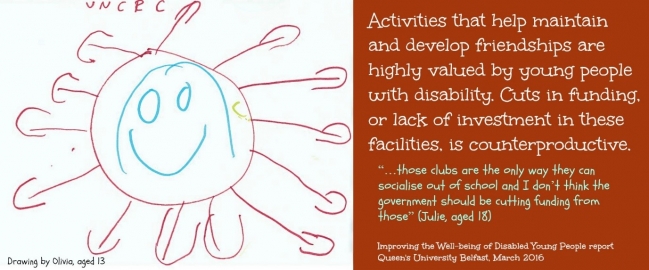Promoting the well-being and mental health of all young people is a key aspect of national and international government policy but too often we don’t hear from the young people themselves. To address this gap, a group of young people from the Barnardo’s Advocacy Group 6th Sense in Northern Ireland initiated a research proposal on the emotional well-being needs of adolescents with disabilities. These young people were determined to have their voices heard in an effort to make things better – not just for themselves – but for other young people with similar experiences.
The result is the report ‘Improving the Well-being of Disabled Young People’, which I researched with Berni Kelly and Geraldine Macdonald. No limitations were placed on the degree of disability so the study includes young people who are often excluded from research projects due to perceived methodological challenges based on access and communication difficulties and predetermined assumptions of disabled children’s abilities.
Through conversations with 37 disabled adolescents, the report identifies common triggers for positive and negative feelings and highlights opportunities for enhancing well-being. The young people talk about how they manage the stresses they encounter, what they see as the impediments to well-being and where opportunities to enhance well-being may lie. They discuss the things they perceive to be the most valuable for building their capacity to enjoy a happy and fulfilled life and how their experiences (positive and negative) build the conditions that can enhance or diminish well-being.
The report finds that what constitutes good well-being for disabled young people differs little from that of their non-disabled peers – positive family relationships, good friendships, social interaction and participation. But what was different, was the high reliance on family/carers for facilitating opportunities for these young people to take part in activities and engage socially with their peers. For example, dependence on transport for engaging in social participation was high for the majority of participants. This places heavy demands on parents/carers emotionally, practically and financially. Valued activities were those that helped participants maintain and develop friendships. Typically these included attending formal clubs and/or societies outside of their local neighbourhood. Respite services also played an important role in enhancing quality of life of participants because it was viewed as a step towards independence.
Good psychological well-being was characterised by having aspirations, choice, autonomy, self-determination and a sense of reaching their potential. The interaction of all these factors together influenced happiness, contentment and satisfaction. Negative experiences depleted well-being and here, bullying, disrespect, dependence, lack of choice and an overprotectiveness towards parents stand out as significant stressors.
We conclude by setting out ten key messages to inform policy and practice, linking their observations to principles of the UNCRPD and the UNCRC which underpin much of the legislation and policy for children and young people. These points include:
• the need to appreciate the higher demands that families/carers with a disabled child face and thus our obligation to protect disabled young people and their families from poverty;
• the importance of formal sources of participation for social interaction, their value for enhancing well-being and how cuts in funding to, or lack of investment in, existing services are counterproductive;
• the way increased investment in arts and culture would prove value for money in terms of positive social and financial outcomes;
• that bullying and disrespect is encouraged by negative stereotypical attitudes and ignorance and how we have a responsibility to challenge such views;
• how relevant public involvement of young people with particular needs in the design stages of community programmes can overcome barriers to participation.
If we are serious about improving the well-being of young adults with a disability, society needs to ensure that the opportunities for living a happy and fulfilling life are available to them, and the conditions which deplete their well-being are addressed.
The report, ‘Improving the Well-being of Disabled Young People’ by Dr Grace Kelly, Dr Berni Kelly and Professor Geraldine Macdonald was funded by the Northern Ireland Public Health Agency, Research and Development. The full report can be downloaded below.
Dr Grace Kelly works at the Institute of Child Care Research, Queen’s University Belfast. She was a member of the Poverty and Social Exclusion 2012 research team.




 PSE:UK is a major collaboration between the University of Bristol, Heriot-Watt University, The Open University, Queen's University Belfast, University of Glasgow and the University of York working with the National Centre for Social Research and the Northern Ireland Statistics and Research Agency. ESRC Grant RES-060-25-0052.
PSE:UK is a major collaboration between the University of Bristol, Heriot-Watt University, The Open University, Queen's University Belfast, University of Glasgow and the University of York working with the National Centre for Social Research and the Northern Ireland Statistics and Research Agency. ESRC Grant RES-060-25-0052.






